
Thousands of dead birds have been recently collected from the marshes of the eastern province of Van, raising concerns among locals.
Diarrhea resulting from a parasitic infestation is believed to be behind the mass bird deaths in the Erciş district located on the northwestern shores of Van Lake, Erçek Lake and the Çelebibağ reeds.
“Following a clinical and lab inspection, it has been determined that the birds had diarrhea due to a parasitic infestation, which caused the mass deaths,” said a report prepared by the Yüzüncü Yıl University in Van.
“An analysis conducted at the places of deaths showed the birds were habitating in high density populations and there were puddles in various sizes. It has been determined that these puddles were exposed to a high inflow of birds with the increase in temperatures and were thereby very polluted. This pollution increased further with environmental factors,” said the report, prepared by the university’s directorate of wild animal protection and rehabilitation center.
“It has been determined that this year’s offspring [of birds] was infected with parasites in the waters in this region, leading to the relevant illness. We are of the opinion that once the wetlands are no longer polluted, these deaths will decrease in number further,” the report said.
The district of Erciş’s Kasımbağı neighborhood is located on the coastline of Lake Van, which is Turkey’s largest lake and makes up one-fifth of the country’s wetland region. Several bird species, including flamingos, swans and herons, flock to the area for breeding and feeding each year. Festivals are organized each year around Lake Van in correspondence with bird migration schedules.
However, this year, the mass bird deaths especially in the Kasımbağı neighborhood marshlands have raised concern, with Erciş locals demanding a statement from officials. “Birds are paralyzed, they cannot move their feet, cannot flutter their wings and then die. We have to say ‘stop’ to this,” said a local association head.